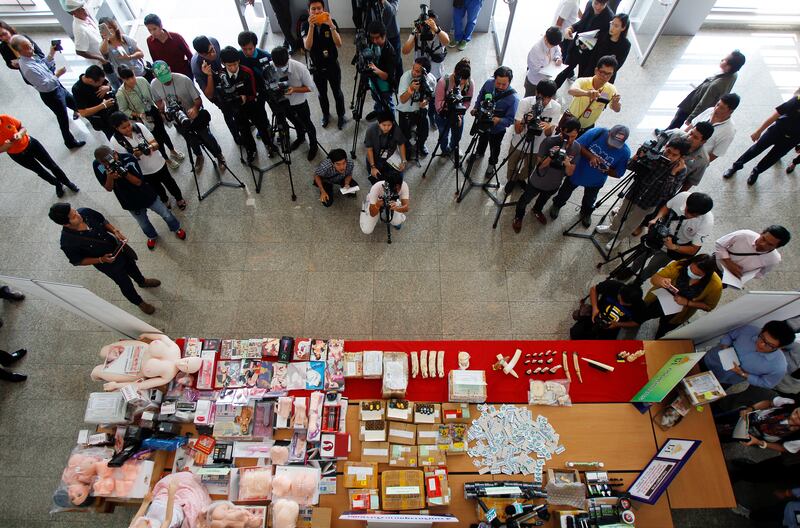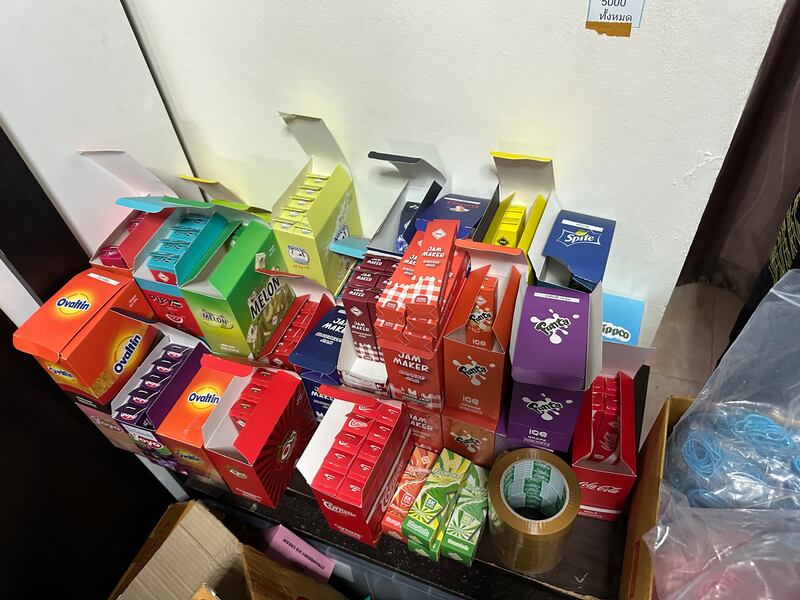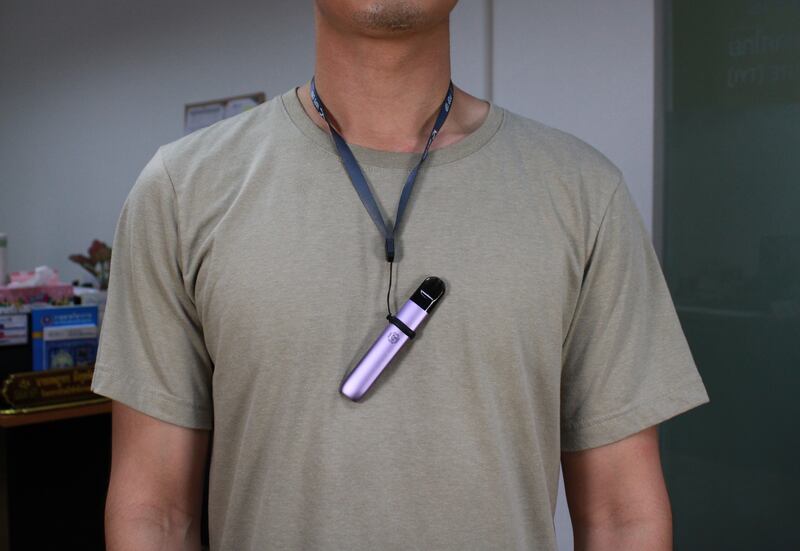“Kat,” a Thai chain smoker hooked on traditional smokes since she was a teen, is hoping e-cigarettes will help her kick the habit.
She has taken to vaping, although e-cigarettes and vape devices are outlawed in Thailand.
“I have smoked two packs of cigarettes since I was 18,” the 38-year-old Thai entrepreneur said.
“Currently I puff in an e-cigarette a few times an hour only to deliver into my body a certain level of nicotine before I can quit it permanently. I have no intention of using e-cigarettes forever,” she said.
“Kat” is not her real name. She requested that BenarNews identify her only by this pseudonym for privacy concerns and because what she does is considered illegal here. Kat is aware that the use, sale and advertisement of vaping devices and e-cigarettes are prohibited in Thailand.
And yet, it’s not so hard to find these on the streets of Bangkok, she said.
“You can find it on Sukhumvit Road,” Kat said, referring to one of the main avenues in the central part of the Thai capital. “If they are easier to find at a certain time, it means the crackdown at that time is not too serious. But if they start to get rare, it means the crackdown is getting tight.”
Kat is among a growing number of e-cigarette users in Thailand where authorities have launched a crackdown to prevent youths from becoming new users of vapes and assorted paraphernalia.
Authorities said the devices are designed to lure kids and are more dangerous than tobacco. Through online distribution, vape devices and material are proliferating and reaching new customers 18 years old or younger.

Because e-cigarettes, or vapes, are easier for youths to obtain due to online distribution and lax regulations, it will be harder for them to quit when they are older, according to one expert.
“The most serious thing about vapes in Thailand is that even primary school children can get it. If you are addicted to nicotine when you are young, there is only a 30% chance that you can quit it as an adult,” said Dr. Wijj Kasemsup, director of the Tobacco Control Research and Knowledge Management Center at Ramathibodi Hospital in Bangkok.
Not for children
An e-cigarette is a device that can take many shapes. It most commonly comes in the form of a stick with a chamber to hold a liquid substance that, when heated, will emit an aerosol containing nicotine.
Sometimes it comes with a battery for multiple uses. Other types of e-cigarettes are disposable.
In Thailand as of late, imported e-cigarettes have materialized in the shape of a plastic doll, making it more appealing for children.
“In one case, a parent posted a short clip of a toy-like vape on social media and we sent a team to inspect [this] in the northeast of Thailand,” said Patcharapan Prajuablap, secretary-general of the Thailand Youth Institute, a government-funded anti-vape group.
“We found a primary school kid who did not even know that that was an e-cigarette. He thought it was a toy with nice-smelling fumes to inhale.”
Unlike cigarettes, e-cigarettes contain no tobacco. The liquid is synthesized, which means the level of nicotine can be dangerously high and that certain odors can be added for gimmick, along with certain dangerous substances, Wijj said.
According to the U.S.Centers for Disease Control and Prevention (CDC), there are a variety of substances in a vape aerosol. These include nicotine, ultrafine particles that can penetrate the lungs and chemicals used for flavoring that can cause serious lung disease. There are also heavy metals such as nickel, tin and lead.

E-cigarette manufacturers have always targeted juvenile customers, “because that’s how they increase the number of their life-long customers,” Wijj said, adding the manufacturers are being challenged on those grounds.
In recent years, U.S.-based vape manufacturer Juul Labs Inc. had to deal with lawsuits in various states pertaining to the “deceptive” marketing of its products to underage users. Vapes are banned in certain U.S. states.
Younger and younger
In Thailand, the crackdown has focused on closing e-cigarette shops and confiscating vape devices and associated materials. Establishments selling the products have been found to have proliferated near schools.
Prateep Charoengul, deputy secretary-general of the Office of Consumer Protection Board, said his agency’s regulations cover sales of vapes, while the use of these devices may have to be covered by customs regulations because no domestic manufacturer has been found.
Prateep said because of bribery issues, cooperation from other departments, such as police, has been lacking, which makes the crackdown effort all the more challenging.
“Thai sellers of e-cigarettes can get profits as high as 30% to 40%, which is quite rare in other kinds of businesses nowadays,” he said.
However, purchases can still be made via certain online channels even though in February, a government official said that about 1,300 online distribution portals were being shut down.

According to theGlobal School-based Student Health Survey, the use of e-cigarettes among school children (ages 13 to 15) in Thailand has increased in recent years from 3.3% in 2015 to 8.1% in 2021.
Patcharapan, from the Thailand Youth Institute, linked vape popularity among Thai youths in recent years to the COVID-19 pandemic. He put this down to “parents buying internet devices like tablets for children during school lockdowns.”
Many of the e-cigarette shops in and outside Bangkok are within a kilometer of schools, Patcharapan said. Many shops also provide space for customers to use the device.
Kat, the vape user, said e-cigarettes should be legalized because she believes it will be “easier to control ingredients that produce smells to lure young customers.”
She said even in Asia, countries have different approaches to vape. Japan categorizes it as an alternative to smoking, but only allows the use of nicotine in e-cigarettes with a prescription, while Singapore outlaws e-cigarettes altogether.
“I don’t prefer sweet smells of vape, like strawberry odor. I want something similar to cigarettes, but it is even harder to find,” she said.
“But since I started using vape, I think my appearance has gotten better. The color of my lips, teeth, nails and gums that was changed because of cigarettes is now normal. I also cough so much less now.”
Vape was developed in 2003 by a Chinese pharmacist Hon Lik who marketed it the following year, gaining some attention among Chinese smokers early on as a potential cessation device or an alternative cigarette product.
“While the tobacco industry is going downward. Vape has become more alarming. It looks nice and smells nice. Many customers who shun cigarettes because of the smell can try vape and like it. Its deadliest aspect is its appeal,” Wijj told BenarNews.
